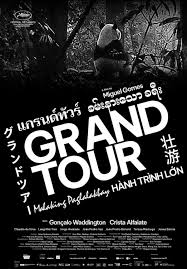
GRAND TOUR
Portugal, 2024, 128 minutes, Black-and-white and colour.
Goncalo Waddington, Crista Alfaiate.
Directed by Miguel Gomes.
An exciting title. However, a reviewer has to search for words to indicate the style and impact of the film. Two words that come to mind are “exotic” and “esoteric”.
And these are adjectives suitable for a description of the career of the writer-director, Miguel Gomes, for the range of films over 20 years. He is a Portuguese director whose “arthouse” feature films have been very popular on the film Festival circuits. Gomez does incorporate narrative but not in any linear, start to finish, manner. He is comfortable in moving, often very quickly, from place to place, country to country, looking forward, flashbacks, his characters as well as his audiences, sometimes lost in time. And he is fond of filming in black and white, impressively striking black-and-white photography.
Which does lead us to the consideration of Grand Tour. One of the exotic aspects is that his central characters are both English, one a civil servant working in Singapore, the other his fiancee who comes to Asia in search of him. And, they speak in Portuguese, the British style of the characters and their Portuguese dialogue creating some of something of an anomalous experience for the audience. And, once again there is the striking black-and-white photography but frequently moving into colour, often unexpectedly, scenic, fairground scenes with puppets…
And the film is also exotic in so far as this tour, which, ultimately, is not so grand, moves from Singapore to Thailand to Vietnam to Japan to China and its far reaches. (While the film was made during the Covid era, and much of the film produced in studios, Gomes directed by communication to the different countries for scenic footage.
And for the esoteric. The action opens in Singapore in 1918 and Edward, the British civil servant, is immersed in the period, in means of communication, in transport, his moving from country to country, the film footage is not confined to 1918. Often, there are contemporary images of Asian cities – and for visitors to Vietnam, a reminder of the heavy cycle traffic in the streets. So, playing with time, the action of the past, yet the timelessness of the story and the characters.
As Edward goes on his grand Tour of the Asian countries, and journeys into the interiors of China, his story stops. The audience is introduced to Molly, the fiance, arriving, determined to find Edward, eager for marriage, more attention given to her character than to Edwards, venturing on her travels, pursuing Edward (and again time doesn’t matter, she is suddenly here, suddenly there, close to Edward, searching for him in a train wreck, always missing him) but enjoying quite a different Grand Tour for herself, the range of people she meets, her emotional struggle, and her future.
Definitely a cinema experience for an audience which appreciates something different, excited by the director’s different vision, approach to filmmaking, unexpected storytelling and moving between time eras, moments of realism, surreal moments, moments of fantasy, mostly in black and white, sometimes an unexpected cover.
Miguel Gomes won the award for Best Director at Cannes 2024.